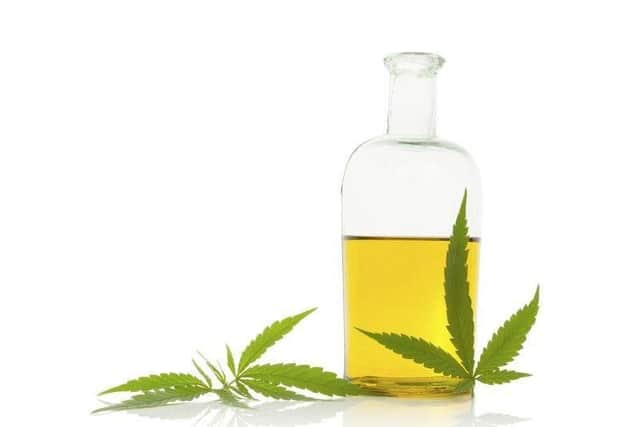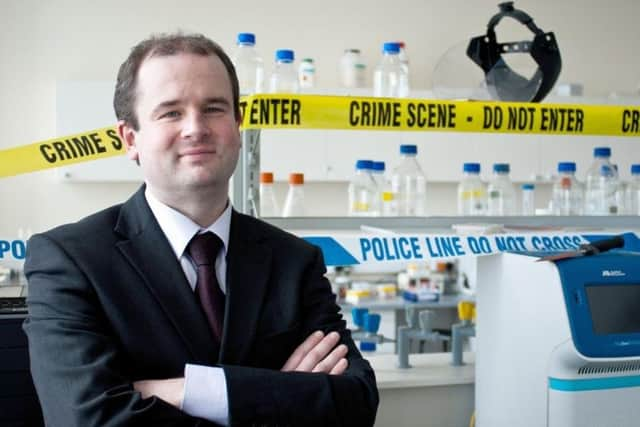Does cannabis oil really work?
and live on Freeview channel 276
Globally, the market is now worth billions – but are businesses flogging an ever-increasing range of CBD oils, ice creams, and even sweets in a cynical get rich quick scheme, or is the cannabis-derived ingredient a new wonder drug?
Don’t ask a retailer. By law they’re not allowed to sell CBD for medicinal purposes without a licence – and none have been granted yet – nor are they allowed to make any claims about its possible health benefits.
Advertisement
Hide AdAdvertisement
Hide AdLook online though and you’ll be swamped by website editorials claiming it can help with anxiety or depression, relieve pain, ease the symptoms of cancer, and even reduce acne.


Dr Michael Porter, a lecturer in molecular genetics and cell biology at the University of Central Lancashire (UCLan), warned there’s little evidence to prove high street products containing CBD can treat any ailments, and urged people to speak to their GP instead.
It comes after one shop in Blackpool was ordered to remove signs describing the oil as being for a “medical purpose only”.
By law, CBD products sold for medicinal purposes must be licensed, which means retailers have to sell it as a food supplement instead.
Advertisement
Hide AdAdvertisement
Hide AdPrices vary, but one national retailer was recently selling a 30ml bottle - containing five per cent CBD - for £44.99. A bottle of Chanel perfume is cheaper.


And Dr Porter said: “Evidence for its benefits in treating disease symptoms is unfortunately very limited and much more research is needed to identify where cannabis-based drugs will be of most use and any potential long-term effects.”
He said there is some “limited evidence” to suggest cannabis-based products available on prescription, which have varying amounts of CBD in them, could be used to treat chronic pain, some forms of epilepsy, and nausea and vomiting caused by chemotherapy.
But he added: “Non-medicinal CBD products are legal and widely available on the internet and from health food retailers, but they lack quality standards and should never be used for medicinal purposes.
Advertisement
Hide AdAdvertisement
Hide Ad“Anyone using CBD oil on the high street is extremely unlikely to gain any benefit whatsoever, while spending a great deal of money and using a product which lacks the quality control levels of a medicine.”


CBD is extracted from the flowers and buds of cannabis plants and does not contain the pschoactive element THC – the part of the recreational drug that makes people high.
To remain legal in the UK, the level of THC in CBD products is not allowed to exceed 0.2 per cent.
But that hasn’t stopped CBD from rocketing in popularity.
It was likened to “2019’s avocado toast, this moment’s turmeric shot” by one national newspaper, which added: “If CBD does what its advocates suggest - or even a fraction of it - this all-natural, side effect-free, widely available chemical could genuinely be the wonder drug of our age.”
Advertisement
Hide AdAdvertisement
Hide AdBut the Medicines and Healthcare products Regulatory Agency (MHRA), which is responsible for making sure medicines work, has yet to grant a single medicinal licence for CBD.
“Licensed medicinal products have to meet safety, quality, and efficacy standards to protect public health,” it said when it took a formal position on CBD in October 2016.
It added: “Our primary concern is patient safety and we wish to reiterate that individuals using cannabidiol (CBD) products to treat or manage the symptoms of medical conditions should discuss their treatment with their doctor.”
Regulated CBD ‘effective epilepsy treatment‘
The World Health Organisation said in a report that CBD “has been demonstrated as an effective treatment of epilepsy in several clinical trials”, with one pure CBD product, Epidiolex, going through the licensing process.
Advertisement
Hide AdAdvertisement
Hide Ad“There is also preliminary evidence that CBD may be a useful treatment for a number of other medical conditions,” it added, though the charity Epilepsy Action warned “most studies have used highly-regulated pharmaceutical grade CBD under medical supervision”.
It added: “We don’t know if unregulated CBD products, for example those available in ... shops, are safe or effective.”
The NHS said “many cannabis-based products are available to buy online but their quality and content is not known”, and warned: “They may be illegal and potentially dangerous.
“Some products that might claim to be medical cannabis, such as CBD oil or hemp oil, are available to buy legally as food supplements from health stores.
Advertisement
Hide AdAdvertisement
Hide Ad“But there’s no guarantee there are of good quality or provide any health benefits.”
Our columnist Jenny Logan recently shared her tips to ensure the quality of a CBD product before buying it.
++ Is the supplier well established? How long have they been trading for?
++ Is every batch tested and checked for THC content? What maximum level will the supplier check for?
Advertisement
Hide AdAdvertisement
Hide Ad++ Is the product clearly labelled? Do you know exactly what you are buying and what does you will get each time?
‘Do you know what you are taking?’
Kelsey Clark took CBD oil for her anxiety, and journalled her findings online.
At first she was skeptical, she said. By the end, she said she would stop short of saying it had “fundamentally changed” her life.
“With that said,” she added. “I’m definitely intrigued enough by the subtle effects to continue taking the oil and possibly even to up the dosage to the recommended two full droppers of the 30mL bottle per day for a week or so.”
Advertisement
Hide AdAdvertisement
Hide AdNick Tofalos, an experienced osteopath who sells CBD oil from his shop, Garstang Natural Health, said: “People will come in and say, ‘Will it help me with pain?’ The simple answer from a retailer is ‘We don’t know, there’s only one way to find out.’
“Most people, most of the time, have done their own research.”
Nick said people should feel safe buying the product from a reputable retailer but warned of “charlatans” flogging below-par versions.
“That has been happening,” he said. “Therefore, the concern is, ‘Do you know what you are taking?’
Advertisement
Hide AdAdvertisement
Hide Ad“Most will not be toxic or dangerous, it just won’t be any good. There are charlatans out there conning people. They are selling very poor quality products at a very high price.
“They don’t have a health background, they are just trying to make money. It means the public are vulnerable because people don’t know where to turn.”
Nick, whose products have been tested for safety in labs, said buyers should look for “deep brown” CBD oil with an earthy, grassy smell, and should turn to experts who are able to answer questions, like whether the product will affect any current medication they are on.
Shop rapped over ‘medical cannabis oil’
A Blackpool shop recently landed itself in hot water with the council after posting signs outside saying “medical cannabis oil sold here” and “cannabis extract oil - medical
purpose only”.
Advertisement
Hide AdAdvertisement
Hide AdBy law, CBD oils cannot be advertised as medicinal without a licence, and no claims about their possible health benefits can be made by retailers.
Council workers visited the store, in the town centre, which removed the signs and will face no further action, a spokeswoman said.